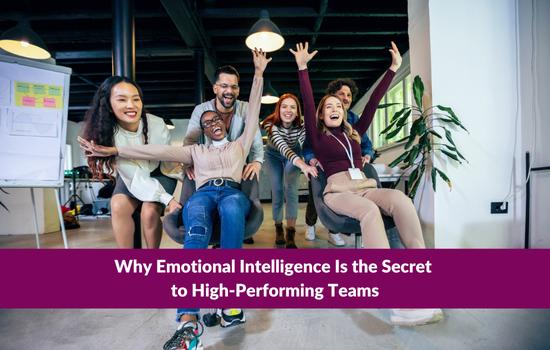In today’s rapidly evolving workplace, technical expertise alone isn’t enough to drive success. The teams that consistently thrive are those rooted in trust, empathy, adaptability, and strong communication, qualities grounded in one essential capability: emotional intelligence (EI). Prioritizing EI not only strengthens leadership development but also fuels employee engagement and creates a more connected, resilient organizational culture.
The ROI of Emotional Intelligence: A Smart Strategy for Thriving Teams

Far from being a “soft” skill, EI is a measurable, learnable competency that transforms team dynamics, strengthens workplace culture, and fuels sustained performance. As organizations face rising demands for innovation, diversity, and resilience, emotional intelligence is no longer optional—it’s essential.
What Is Emotional Intelligence?
Emotional intelligence is the ability to recognize, understand, and manage our own emotions and to recognize, understand, and influence the emotions of others. Psychologist Daniel Goleman outlined five core components:
-
Self-awareness – Understanding your emotions and their impact on behaviour
-
Self-regulation – Managing emotional impulses and staying composed under pressure
-
Motivation – Directing emotions toward purpose and perseverance
-
Empathy – Acknowledging and responding to the emotional experiences of others
-
Social skills – Building trust, collaboration, and meaningful relationships
Unlike IQ, which is largely fixed, EI can be strengthened over time with training, coaching, and practice. And while IQ may help land the job, it’s often EI that determines long-term success and leadership effectiveness.
According to TalentSmart, 90% of top performers exhibit high EI, underscoring its direct impact on leadership and team outcomes.
Why Emotional Intelligence Matters in the Workplace
When EI is embedded in your workplace, the benefits cascade across every level of the organization:
✅ Improved communication and reduced conflict
✅ Greater collaboration and cross-functional synergy
✅ Confident, thoughtful decision-making
✅ Higher employee morale and retention
✅ A more agile and resilient team culture
Teams with high EI create spaces where people feel heard, valued, and empowered, unlocking deeper engagement and a shared commitment to success.
The ROI of Emotional Intelligence
Investing in EI is not just good for people, it’s smart business. Research shows companies with emotionally intelligent leaders experience:
-
Lower turnover and absenteeism
-
Stronger innovation and financial performance
A compelling example is Google’s Project Aristotle, which found that psychological safety, a core outcome of EI, was the single most important factor in high-performing teams. Emotional intelligence drives honest dialogue, creativity, and resilience, directly improving outcomes.
How Emotional Intelligence Builds Thriving Teams
Thriving teams aren’t just skilled; they’re emotionally connected and psychologically safe. Emotional intelligence fosters:
-
Openness to feedback and learning from failure
-
Inclusion of diverse perspectives
-
Adaptability and calm in moments of crisis
Especially during times of change, teams led by emotionally intelligent leaders respond with clarity and empathy, rather than stress or defensiveness.
How to Build EI in Your Organization
To unlock the full potential of your teams, embed EI into the fabric of your business:
-
Start at the Top: Incorporate EI into leadership development programs. Leaders set the emotional tone, and those who demonstrate empathy and self-awareness create more connected and resilient teams.
-
Hire for EI: Use behavioural interview questions and scenario-based prompts to evaluate emotional intelligence during the hiring process. Then, reinforce EI as a core value during onboarding.
-
Invest in Ongoing EI Training: Offer regular workshops, team coaching, peer mentoring, and learning opportunities focused on topics like conflict resolution, emotional regulation, and active listening.
-
Recognize and Reward EI in Action: Celebrate team members who model emotionally intelligent behaviours, especially during high-pressure situations. Recognition encourages consistency and culture-wide adoption.
-
Measure What Matters: Use surveys, 360 reviews, and team assessments to track EI growth. Monitor how these skills impact retention, engagement, and collaboration, just like any other performance driver.
Emotional intelligence isn’t soft; it’s a strategic differentiator that drives better business outcomes.
Ready to Build More Emotionally Intelligent Teams?
Here’s how Marshall Connects can help you foster high-performing, emotionally intelligent leaders and teams:
-
Take an EQ-i 2.0 Assessment – Understand your current emotional intelligence profile
-
Read The Power of Emotion – Discover practical tools for building EI skills
-
Book a Custom Workshop – Train your team to thrive through empathy, adaptability, and connection
👉 Contact us to learn how we can support your people-first strategy with proven EI training and tools.
In a world of constant change, emotional intelligence gives your teams the clarity, cohesion, and confidence to succeed, together. So ask yourself: Is your team built to survive… or ready to thrive?
Emotional intelligence isn’t just a personal asset; it’s a business imperative. By embedding EI into your culture, you empower teams to collaborate more effectively, lead with empathy, and thrive through change.
More Motivational Reads Here »
How Emotionally Intelligent Are You?
Sign up for Linda’s monthly tips to build your Emotional Intelligence and reduce Emotional Hijacking!

















